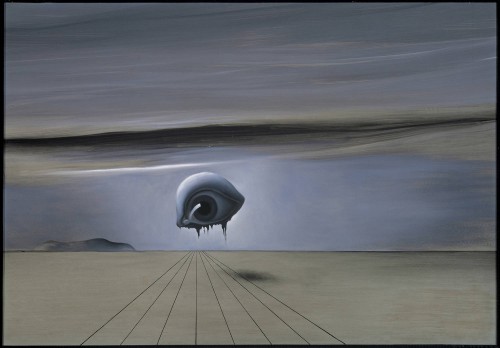BBM 413 - Fundamentals of Image Processing (Fall 2013)
Lectures: Friday 13:00-15:45 @D8

Salvador Dali’s Study for the Dream Sequence in Spellbound (1945)
Instructor: |
Erkut Erdem |
|||
erkut-at-cs.hacettepe.edu.tr |
||||
Office: 114, Tel: 297 7500 / 149 |
||||
Office Hours: Friday 10:00-11:00 |
||||
Lectures: |
Friday, 13:00-15:45 @ D8 |
Practicum: |
Thursday, 15:30-17:30 @ D9 |
|
TAs: |
Levent Karacan |
|||
karacan-at-cs.hacettepe.edu.tr |
||||
Office Hours: To be announced! |
Course Description:
The subject matter of this advanced undergraduate course is about the fundamentals of image processing. The course is structured around key topics in image processing, including image formation, point operations and histogram processing, spatial filtering techniques, frequency domain approaches, image smoothing, edge detection and image segmentation. The main aim of this course is to provide an introduction to students who wish to specialize in interrelated disciplines like image processing, computer vision and computational photography. The students are expected to develop a foundational understanding and knowledge of concepts that underly image processing and related fields. The students will also be expected to gain hand-on experience via a set of programming assignments supplied in the complementary BBM 415 Image Processing Practicum. Hence, the students are strongly advised to register both BBM 413 and BBM 415 classes.
Prerequisites:
Good math (calculus, linear algebra, statistics) and programming skills. Students are not expected to have any prior knowledge of image processing techniques.
Textbooks:
Grading Policy:
Grading for BBM 413 will be based on a set of reading assignments (15%), a midterm exam (35%) and a final exam (45%). Participation in class discussions will also be an important factor for the grade (5%). In BBM 415, the grading will be based on at least 4 programming assignments which will be done individually.
Important Dates:
Programming Assignment 1 |
18 October 2013 |
Programming Assignment 2 |
11 November 2013 |
Programming Assignment 3 |
6 December 2013 |
Programming Assignment 4 |
20 December 2013 |
Midterm exam |
29 November 2013 |
Final exam |
To be announced later. |
Detailed Schedule:
Week |
Date |
Topic |
From the book |
Additional Readings |
Assignments |
1 |
10/4 |
Introduction [slides] [4-per-page] |
S1 |
D. Marr, Vision. Chapter 1 |
|
2 |
10/11 |
Image formation and the digital camera [slides] [4-per-page] |
S2.1-2.3.1 |
||
3 |
10/18 |
No class (Religious Holiday) |
|||
4 |
10/25 |
Color perception and color spaces [slides] [4-per-page] |
S2.3.2 |
Beau Lotto's TED Talk: Optical illusions show how we see |
|
5 |
11/1 |
Point operations [slides] [4-per-page] |
S3.1, GW3.1-3.3 |
PA1 due |
|
6 |
11/8 |
Spatial filtering [slides] [4-per-page] |
S3.2-3.3 |
PA2 out |
|
7 |
11/15 |
Frequency Domain Techniques [slides] [4-per-page] |
S3.4, GW4.1-4.10 |
||
8 |
11/22 |
|
S3.5, GW7.1 |
PA2 due |
|
9 |
11/29 |
Midterm exam |
|||
10 |
12/6 |
Image pyramids and wavelets [slides] [4-per-page] |
S3.5, GW7.1 |
A. Oliva, A. Torralba, P.G. Schyns, Hybrid Images, ACM Transactions on Graphics, ACM SIGGRAPH, 25-3, 527-530, 2006 |
|
11 |
12/13 |
Gradients, edges, contours [slides] [4-per-page] |
S4.2,4.3.1-4.3.2 |
D. Marr and E. Hildreth, Theory of Edge Detection, Proc. R. Soc. Lond. B, 1980 |
PA3 out |
12 |
12/20 |
Image segmentation I [slides] [4-per-page] |
S5.1-S5.2 |
E. Borenstein and S. Ullman, Class-Specific, Top-down Segmentation, ECCV 2002, LNCS 2351, pp. 109-122, 2002 |
|
13 |
12/27 |
Image segmentation II [slides] [4-per-page] |
S5.3-5.5 |
PA3 due, PA4 out |
|
14 |
1/3 |
Image smoothing [slides] [4-per-page] |
S3.2 |
||
Additional Resources:
Communication:
The course webpage will be updated regularly throughout the semester with lecture notes, programming and reading assignments and important deadlines. All other communications will be carried out through Piazza. Please enroll it by following the link https://piazza.com/hacettepe.edu.tr/fall2013/bbm413
Policies:
All work on assignments must be done individually unless stated otherwise. You are encouraged to discuss with your classmates about the given assignments, but these discussions should be carried out in an abstract way. That is, discussions related to a particular solution to a specific problem (either in actual code or in the pseudocode) will not be tolerated.
In short, turning in someone else’s work, in whole or in part, as your own will be considered as a violation of academic integrity. Please note that the former condition also holds for the material found on the web as everything on the web has been written by someone else.